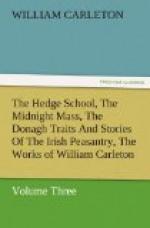This ceremony-was performed as a commemoration not only of the night, but of the hour in which Christ was born. To connect it either with edification, or the abuse of religion, would be invidious; so we overlook that, and describe it as it existed within our own memory, remarking, by the way, that though now generally discontinued, it is in some parts of Ireland still observed, or has been till within in a few years ago.
The parish in which the scene of this story is laid was large, consequently the attendance of the people was proportionably great. On Christmas day a Roman Catholic priest has, or is said to have, the privilege of saying three masses, though on every other day in the year he can celebrate but two. Each priest, then, said one at midnight, and two on the following day.
Accordingly, about twenty or thirty years ago, the performance of the Midnight Mass was looked upon as an ordinance highly important and interesting. The preparations for it were general and fervent; so much so, that not a Roman Catholic family slept till they heard it. It is true it only occurred once a year; but had any person who saw it once, been called upon to describe it, he would say that religion could scarcely present a scene so wild and striking.
The night in question was very dark, for the moon had long disappeared, and as the inhabitants of the whole parish were to meet in one spot, it may be supposed that the difficulty was very great, of traversing, in the darkness of midnight, the space between their respective residences, and the place appointed by the priest for the celebration of mass. The difficulty, they contrived to surmount. From about eleven at night till twelve or one o’clock, the parish presented a scene singularly picturesque, and, to a person unacquainted with its causes, altogether mysterious. Over the surface of the surrounding country were scattered myriads of blazing torches, all converging to one point; whilst at a distance, in the central part of the parish, which lay in a valley, might be seen a broad focus of red light, quite stationary, with which one or more of the torches that moved across the fields mingled every moment. These torches were of bog-fir, dried and split for the occasion; all persons were accordingly furnished with them, and by their blaze contrived to make way across the country with comparative ease. This Mass having been especially associated with festivity and enjoyment, was always attended by such excessive numbers, that the ceremony was in most parishes celebrated in the open air, if the weather were at all favorable. Altogether, as we have said, the appearance of the country at this dead hour of the night, was wild and impressive. Being Christmas every heart was up, and every pocket replenished with money, if it could at all be procured. This general elevation of spirits was nowhere more remarkable than in contemplating the thousands of both sexes, old, young, each furnished,




